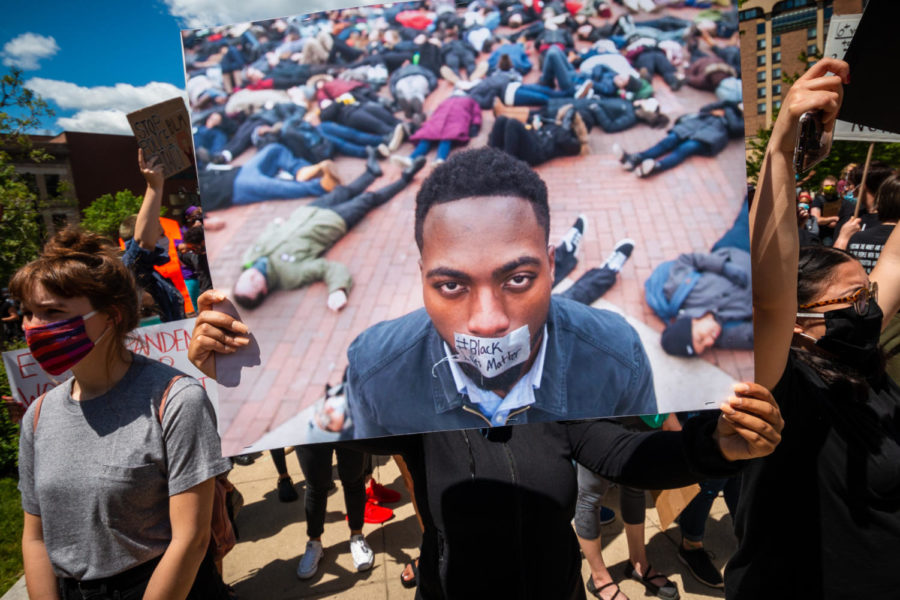Editorial: COVID-19 stimulates the Black Lives Matter movement
Ken Fager
The ISD Editorial Board examines the effect of COVID-19 on the Black Lives Matter movement, declaring the pandemic has actually intensified the protests.
June 28, 2020
Few stories have dominated the headlines of 2020: COVID-19 and the protests driven by the Black Lives Matter movement. The streets of this country are either plagued by the virus or filled to the brim with eager protesters. As the most prominent news stories continue to span months of time, they continue to coexist in the same environment.
So, we can then begin to question if one has affected the other: what effect has coronavirus had on the movement?
While public health, the economy and other aspects of the country are impacted negatively by COVID-19, the virus, surprisingly, positively affects the Black Lives Matter movement.
The country witnessed — and is still witnessing — a massive wave of protests following the deaths of George Floyd, Breonna Taylor, Ahmaud Arbery and many more. Elijah McClain, from Denver, died last summer and his story has recently been brought to the public’s attention. Historically, Black Lives Matter protests have been met with criticism, and these protests are no different in that regard.
What makes these protests different is they are larger and more sustained than has been seen previously. Every single state in the United States has seen protests in the streets of their major cities, and every single state has also had to cope with COVID-19 during the same time. How do you appropriate protests in the midst of a swindling pandemic?
By May, unemployment was reaching and shattering record highs and many Americans found themselves without jobs or anything to do. This coincided with the now infamous killing of George Floyd, a Black man killed during a police response to a counterfeit bill at a local grocery store in Minneapolis.
With newfound spare time, people were able to take their outrage to the streets and share their grief on social media. It can be argued the spare time produced by COVID-19 allowed for the intense effects seen from the continuing deaths due to police brutality, strengthening the movement. The unrest from home stretched to unrest in the streets.
Such an unprecedented display of support has continued to inspire more activists to join the Black Lives Matter cause and amplify the voices of those who have been oppressed for so long. The issue that remains is how long people are willing to protest. If COVID-19 continues to force numbers to rise, will the movement dissipate or continue to voice their demands?
It is impossible to say for certain, but it seems that, without the intervention of coronavirus freeing up more people to join the movement, these protests may not have had the life and longevity they have had so far. In addition to continually seeking justice for those killed unjustly, activists are now using their free time to identify places where historically racist stereotypes and ideals are buried beneath the surface, with multiple companies under fire.
The whole country is under inspection.
But is it wise to be protesting en masse during a global pandemic as cases are spiking across the country? Experts say the protests — which have been going on for weeks — have played little to no role in the spread of COVID-19.
Furthermore, the masks worn by protesters have an additional benefit beyond protecting from the virus: they protect identities. Many protesters wish to remain anonymous while they make their voices heard and coronavirus masks allow them to do just that. The movement appears as one united front.
Additionally, masks inhibit police efforts to track down protestors using facial recognition services, which have been found to be less accurate for women and minorities. This is one more reason protesters are more confident to show up in support of Black lives.
As of Friday afternoon, COVID-19 robbed nearly 125,000 American lives, marking it as one of the deadliest events in our nation’s history, and it will forever be remembered as the 21st century pandemic.
However, this tragedy may give America the opportunity to rise from the ashes as a new nation that strives to create better lives and opportunities for the generations ahead of us, especially for Black and Brown Americans. Stand up and fight for what you believe; history is in the making.







